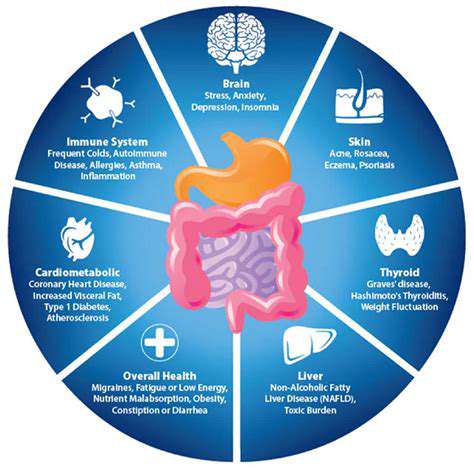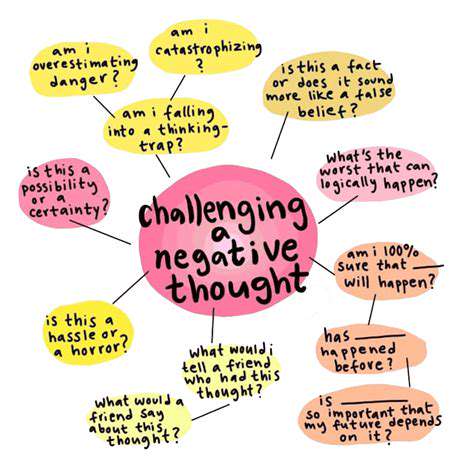Raw Food Challenges: Overcoming Obstacles
Addressing Nutritional Deficiencies
One of the primary challenges in raw food diets is ensuring adequate intake of essential nutrients. Many nutrients, like vitamin B12, are often found in animal products. A well-planned raw food diet requires careful attention to supplement these gaps, which can be overlooked by those new to the raw food lifestyle. This is crucial for maintaining optimal health and preventing potential deficiencies, which can manifest in various ways, from fatigue and weakness to more serious health problems.
A variety of fruits, vegetables, and nuts can provide some essential nutrients, but it's often not enough. Therefore, careful consideration of supplementation and a focus on nutrient-dense raw foods is key to navigating the potential nutritional pitfalls of a raw food lifestyle effectively.
Maintaining Adequate Protein Intake
Protein is essential for building and repairing tissues, and a raw food diet can pose challenges in meeting daily protein requirements. Plant-based proteins, though present in raw foods like nuts, seeds, and legumes, may not always be sufficient to support the body's needs, especially for those with higher protein requirements. Finding appropriate protein sources, such as certain nuts, seeds, and legumes, and understanding how to effectively combine them is crucial for success.
Balancing Macronutrients
Raw food diets often focus on carbohydrates and healthy fats, but maintaining a balanced ratio of all three macronutrients—carbohydrates, protein, and healthy fats—is essential. While fruits and vegetables provide carbohydrates, and healthy fats are present in avocados, nuts, and seeds, the right balance can be challenging to achieve without careful planning and potentially supplementation. A lack of balance can lead to energy fluctuations, mood swings, and overall health issues.
Managing Nutrient Absorption
Raw food advocates often emphasize the benefits of consuming uncooked foods for preserving nutrients. However, some nutrients are more readily absorbed by the body when cooked. Understanding which nutrients are better absorbed in raw versus cooked forms is vital for maximizing nutritional intake on a raw food diet. This knowledge allows for better planning and potentially supplementing specific nutrients to ensure optimal health.
Addressing Vitamin B12 Deficiency
Vitamin B12 is a crucial vitamin often found in animal products, posing a significant challenge for vegans and raw foodists. The absence of B12 in a raw food diet can lead to various health problems. Supplementing with B12 is often necessary to prevent deficiencies and maintain good health. This is an important consideration to incorporate into a raw food lifestyle for optimal health outcomes.
Ensuring Sufficient Fiber Intake
Raw fruits and vegetables are excellent sources of fiber, crucial for digestion and gut health. However, ensuring adequate fiber intake on a raw food diet requires careful selection of high-fiber raw foods and potentially adjusting portion sizes to meet individual needs. A lack of fiber can lead to digestive issues, impacting overall well-being. Therefore, understanding the fiber content of raw foods and the importance of adequate intake is key to a healthy raw food lifestyle.
Overcoming the Potential for Digestive Issues

Digestive Issues and Emotional Well-being
Digestive issues, ranging from mild discomfort to severe conditions, can significantly impact a person's overall well-being. These issues often manifest not only in physical discomfort but can also trigger or exacerbate emotional distress. Stress, anxiety, and even depression can affect the digestive system, leading to symptoms like bloating, indigestion, and altered bowel habits. Understanding this connection is crucial for effectively managing digestive problems and improving mental health. Recognizing the interplay between emotional and physical health is key to developing comprehensive strategies for coping with these challenges. Addressing emotional stressors can often lead to a noticeable improvement in digestive health.
The gut-brain axis plays a critical role in this relationship. This complex network of communication between the brain and the digestive system is responsible for regulating various bodily functions, including digestion. Disruptions to this axis can result in a cascade of problems, affecting both physical and emotional well-being. Exploring and addressing underlying emotional factors can be a powerful step towards improving digestive health. This often involves identifying triggers, practicing stress-reducing techniques, and seeking professional support if needed. Effective management of stress and anxiety can significantly alleviate digestive discomfort and improve overall quality of life.
Dietary Considerations and Digestive Health
The foods we consume have a profound impact on our digestive health. A balanced diet rich in fiber, fruits, and vegetables is essential for optimal digestion. These foods promote healthy bowel movements and support the growth of beneficial gut bacteria. A diet high in processed foods, saturated fats, and sugar, on the other hand, can contribute to digestive issues. Consuming a variety of nutrient-rich foods is crucial to maintain a healthy digestive system.
Paying attention to portion sizes and the timing of meals can also be beneficial. Overeating can lead to indigestion and discomfort. Eating meals at regular intervals and avoiding large meals close to bedtime can help optimize digestion. Hydration is another important aspect of digestive health. Drinking plenty of water aids in the digestion process and helps prevent constipation. Making mindful choices about what we eat and how we eat contributes significantly to a healthier digestive system.
Lifestyle Strategies for Digestive Wellness
Beyond diet, lifestyle factors significantly influence digestive health. Regular physical activity is crucial for overall well-being and can also promote healthy digestion. Exercise helps improve blood flow and can alleviate constipation. Getting enough sleep is equally important for optimal digestive function. Adequate rest allows the body to repair and replenish, which is essential for maintaining a healthy digestive system. Chronic sleep deprivation can disrupt the body's natural rhythms, potentially leading to digestive problems.
Stress management techniques, such as yoga, meditation, or deep breathing exercises, can also play a vital role in promoting digestive health. Chronic stress can negatively impact the gut-brain axis, leading to digestive discomfort. Incorporating stress-reducing practices into daily routines can help maintain a healthy balance and improve digestive function.
Regular exercise, sufficient sleep, and effective stress management are all critical components of a holistic approach to digestive wellness. Implementing these lifestyle adjustments can contribute significantly to improved digestive health and overall well-being.
Crafting Flavorful and Varied Meals: A Culinary Challenge

Elevating Everyday Meals
Transforming your everyday meals into culinary adventures doesn't require elaborate recipes or exotic ingredients. Simple tweaks and mindful choices can elevate the flavor and enjoyment of even the most basic dishes. By focusing on fresh, high-quality ingredients and exploring different flavor profiles, you can create meals that are not only delicious but also nutritious and satisfying. This often involves experimenting with herbs, spices, and different cooking techniques to bring out the best in your ingredients.
Consider incorporating seasonal produce into your meals. This not only ensures freshness and vibrant flavors but also supports local farmers and reduces your environmental footprint. Using seasonal ingredients often leads to more affordable meal options, as well as meals that are bursting with fresh, natural flavors. Choosing ingredients at their peak ripeness guarantees superior taste and texture.
Mastering Flavor Combinations
Understanding the fundamental principles of flavor pairings can significantly enhance your culinary creativity. This involves knowing how different tastes, such as sweet, sour, salty, and bitter, interact and complement one another. For instance, a touch of sweetness can balance the acidity of citrus fruits, while a pinch of salt can highlight the richness of a savory dish. Exploring complementary flavors will unlock new avenues for culinary expression and elevate the overall dining experience.
Don't be afraid to experiment with contrasting flavors! Pairing unexpected ingredients can lead to surprising and delicious results. A spicy dish can be balanced with a refreshing yogurt sauce, or a savory meal can be elevated by a sweet and tangy chutney. By pushing your boundaries and trying new combinations, you'll discover unique flavor profiles and delight your taste buds in the process.
Creating Balanced and Nutritious Dishes
A balanced meal goes beyond just tasting good; it nourishes your body and provides the essential nutrients it needs to thrive. Incorporating a variety of food groups, such as fruits, vegetables, lean proteins, and whole grains, is crucial for a healthy and satisfying meal. This approach ensures that your body receives the necessary vitamins, minerals, and fiber to function optimally.
Paying attention to portion sizes is also an important aspect of creating nutritious meals. Controlling portions ensures that you are consuming the right amount of calories and nutrients to support your individual needs. Understanding your body's nutritional requirements and tailoring your meals accordingly is key to maintaining optimal health and well-being. Understanding your body's needs is essential for making informed food choices and optimizing your overall health.
Addressing Social and Practical Challenges

Addressing the Societal Impact of Technology
The rapid advancement of technology has undeniably transformed our society, impacting everything from communication to commerce. This profound shift necessitates a careful consideration of its social implications, ensuring that technology serves humanity's best interests and not the other way around. We must critically evaluate the ethical implications of these innovations and proactively address the potential for misuse and inequitable distribution of benefits.
This includes exploring issues like digital divides, algorithmic bias, and the potential erosion of privacy. Furthermore, we need to foster a more nuanced understanding of how technology shapes our social interactions and relationships, both positively and negatively.
The Practical Applications of Technological Advancements
Beyond the societal impact, technology offers numerous practical applications across diverse sectors. From streamlining business processes to revolutionizing healthcare, technological advancements are continually improving efficiency and productivity. This is evident in the rise of automation, the development of sophisticated medical equipment, and the increasing accessibility of information.
The ability of technology to connect individuals globally is another key practical application, facilitating communication, collaboration, and the exchange of ideas. This interconnectedness has the potential to foster innovation and progress on a scale never before seen.
Navigating the Digital Divide
A significant challenge in the digital age is the digital divide, which separates those with access to technology and the internet from those without. This disparity can lead to significant social and economic inequalities, hindering opportunities for education, employment, and participation in society. We must strive to bridge this gap through initiatives that promote digital literacy and equitable access to technology.
Targeted programs and investments are crucial to ensure that everyone has the opportunity to benefit from technological advancements. This involves providing training and resources to underserved communities and ensuring that infrastructure is available to all.
Ethical Considerations in Technological Development
As technology continues to evolve, ethical considerations become paramount. We must grapple with questions surrounding artificial intelligence, data privacy, and the potential misuse of advanced technologies. Proactive measures are needed to establish ethical guidelines and regulations to ensure that technological advancements are used responsibly and in alignment with human values.
Open discussions and collaborations between technologists, policymakers, and the public are essential to navigate these complex ethical dilemmas and to ensure that technology serves humanity's best interests.
The Impact on Employment and the Workforce
Automation and artificial intelligence are poised to significantly reshape the workforce, potentially leading to job displacement in certain sectors. This transition necessitates proactive measures to adapt and upskill the workforce, enabling them to navigate the evolving job market. Investing in education and training programs is crucial to prepare individuals for the demands of a technology-driven future.
This includes fostering innovation in educational institutions and promoting lifelong learning opportunities to equip individuals with the skills needed to succeed in a rapidly changing job market.
The Future of Communication and Information Sharing
Technology has fundamentally altered how we communicate and share information, fostering unprecedented levels of interconnectedness. The rise of social media, instant messaging, and online platforms has dramatically reshaped social interactions and the dissemination of news and knowledge.
However, this interconnectedness also presents challenges related to misinformation, disinformation, and the spread of harmful content. Developing strategies to combat these issues and promote responsible information consumption is critical in maintaining a healthy and productive digital environment.
The Role of Policy and Regulation in Shaping Technological Development
Governments play a vital role in shaping the trajectory of technological development by enacting appropriate policies and regulations. This includes establishing frameworks for data protection, promoting ethical AI development, and ensuring responsible use of emerging technologies. Strong policy measures are needed to address the potential risks and ensure that technology benefits all members of society.
Creating a regulatory environment that is both forward-thinking and responsive to the ever-evolving technological landscape is essential. This requires ongoing dialogue and collaboration between policymakers, industry leaders, and the public to ensure that technology serves as a catalyst for progress and well-being.











